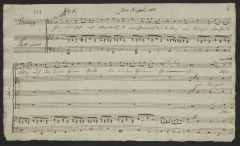For the New Year, according to old custom
Thursday, December 21, 2023

Approaching the end of the year, it seems fitting to call your attention to a musical new year’s greeting from over two centuries ago.
The precious collection of the Berlin Sing-Akademie (D-Bsa), which had gone missing during World War II, was rediscovered in 1999 by Christoph Wolff (later also president of RISM) in the Archive-Museum of Literature and Arts of Ukraine in Kyiv. Two years later – thanks to prompt decisions by both Ukraine’s then president, Leonid Kuchma, and the Ukrainian parliament – the collection was returned to its rightful owner, the Sing-Akademie association, and has since been available for research as a deposit at the Berlin State Library. While the collection – which has in the meantime been cataloged in RISM – includes countless celebrated treasures, in particular related to the Bach family, its lesser-known items are equally precious for those interested in the development of the Sing-Akademie itself or the history of vocal music in Germany in general.
One of these less studied documents is a manuscript (RISM Catalog | RISM Online) containing six songs for multiple voices by Carl Eberwein (1786–1868), a composer best known for his long-standing contact with Goethe, in whose Weimar home he was responsible for the house music. Whether the neatly written manuscript is in Eberwein’s own hand, seems difficult to tell, even though a few obvious corrections in the score appear to confirm such a hypothesis. In any case, the entire set evokes a convivial performing tradition where the composer’s personal participation could be taken for granted: the texts typically celebrate festive occasions or praise drinking, and have accordingly prompted musical settings which emphatically invite all members of a joyful company to join in the singing.
The final piece in the collection, written (as the title makes clear) “For the New Year 1811” is no exception. While it offers (in contrast to the rest of the manuscript) an elaborate keyboard accompaniment, it remains true to the popular “Rundgesang” tradition of the period by having each strophe sung by a solo voice and then letting the full chorus enter for the (textual) repetition of the refrain – apart from the final strophe, where the soloist’s role is taken over by a group of four soloists to ensure a most effective conclusion. This compositional contrast seems as appropriate today as it must have been two centuries ago, and the same can be said for the text, which makes no claims whatever at high poetry, but offers a series of friendly greetings that we are happy to pass on to our own “guests” – that is, to every user of RISM’s services:
(English translation below)
Zum neuen Jahr nach altem Brauch,
Da wünscht man sich das Beste;
Wir Sänger wünschen’s billig auch
Für unsre theuren Gäste.
Sie haben uns beÿ Spiel und Sang
Ein günstig Ohr gegeben,
Drum sollen sie mit Sang und Klang
So heut wie immer leben.
Dann wünschen wir im neuen Jahr
Was uns gefehlt im alten,
Doch was im Alten gutes war,
Das möchten wir behalten.
Die Liebe sucht wohl gern was neu,
Die Treue hält am alten,
So laßt uns dann mit Lieb’ und Treu’
Am alt und neuen halten.
Man sagt ja, daß der neuste Sang
Am meisten stets gefalle,
O wenn es dem nur halb gelang,
Sind wir belohnt für alle.
(English translation:)
For the New Year, according to old custom,
One wishes oneself the best;
We singers also properly wish this
To our precious guests.
They gave us during our playing and singing
A favorable ear,
Therefore they should live with song and sound
Today just as always.
Then we wish in the new year
What we missed in the old,
But what was good in the old,
That we would like to keep.
Love likes to search for the new,
Fidelity sticks to the old,
Thus, let us stick with love and fidelity
To the old and the new.
One says that the newest song
Always appeals the most,
Oh, if this succeeded only half,
We are rewarded for all.
Image: Carl Eberwein, Lieder für mehrere Stimmen, D-Bsa SA 932, RISM ID no. 469093200 (RISM Catalog | RISM Online),
Public Domain Mark 1.0
Category: Events

